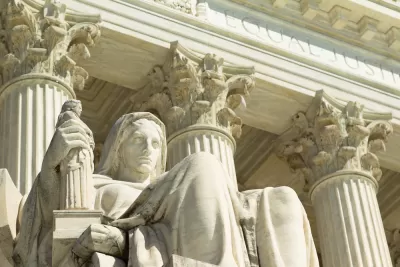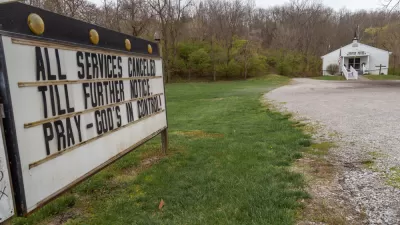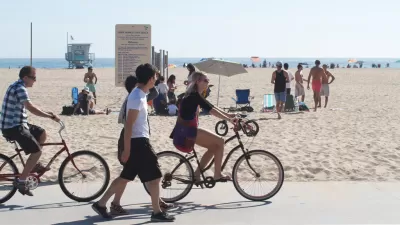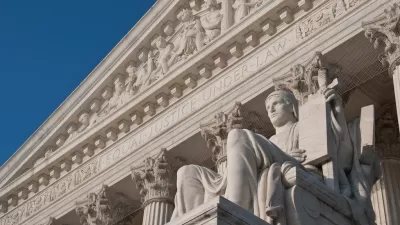In a 5-4 decision, the court voted to uphold the prohibition of religious services that was part of California Gov. Gavin Newsom's stay-at-home order. While the restriction had since been loosened, the plaintiff wanted all restrictions removed.

“California’s latest safety guidelines discriminate against places of worship and in favor of comparable secular businesses,” wrote Justice Brett M. Kavanaugh. “Such discrimination violates the First Amendment.”
Justices Clarence Thomas and Neil M. Gorsuch joined Kavanaugh’s dissent. The court’s order said Justice Samuel A. Alito Jr. also would have granted the church’s request, but he did not join the Kavanaugh statement.
A few days after the Ninth Circuit upheld the church services ban, Newsom issued new, controversial guidance [pdf] that permits indoor church services with one notable restriction.
Places of worship must therefore limit attendance to 25% of building capacity or a maximum of 100 attendees, whichever is lower. This limitation will be in effect for the first 21-days of a county public health department’s approval of religious services and cultural ceremonies activities at places of worship within their jurisdictions.
"Even if just one infected person showed up to such an event, the virus could easily be transmitted to many people and overwhelm local health officials’ ability to investigate all related cases," warned Santa Clara County Health Officer Sara Cody on May 26. Cody worked with five of her counterparts in Bay Area counties to shut down the region just a few days before Newsom did so, which many public health experts credit for their flattening the curve.
Barnes notes that the expert who testified on behalf of California presented evidence of just such infection spread, including "a worship service in Sacramento tied to 71 COVID-19 cases; a choir practice in Seattle [sic]; linked to 32 cases; a Kentucky church revival tied to 28 cases; and a religious service in South Korea where over 5,000 cases were traced back to a single infected individual in attendance.”
Advice to courts
In a follow-up piece published on May 30, Barnes writes that in five paragraphs, "Roberts laid out what will likely be the test for courts going forward."
"Protecting public health is a "dynamic and fact-intensive matter subject to reasonable disagreement, but one the Constitution “principally entrusts” to elected officials.
Generally, he said, “they should not be subject to second-guessing by an unelected federal judiciary, which lacks the background, competence, and expertise to assess public health and is not accountable to the people.”
In his earlier piece, Barnes wrote that Roberts quoted a court precedent in this sentence.
Related in Planetizen:

Planetizen Federal Action Tracker
A weekly monitor of how Trump’s orders and actions are impacting planners and planning in America.

Maui's Vacation Rental Debate Turns Ugly
Verbal attacks, misinformation campaigns and fistfights plague a high-stakes debate to convert thousands of vacation rentals into long-term housing.

Restaurant Patios Were a Pandemic Win — Why Were They so Hard to Keep?
Social distancing requirements and changes in travel patterns prompted cities to pilot new uses for street and sidewalk space. Then it got complicated.

In California Battle of Housing vs. Environment, Housing Just Won
A new state law significantly limits the power of CEQA, an environmental review law that served as a powerful tool for blocking new development.

Boulder Eliminates Parking Minimums Citywide
Officials estimate the cost of building a single underground parking space at up to $100,000.

Orange County, Florida Adopts Largest US “Sprawl Repair” Code
The ‘Orange Code’ seeks to rectify decades of sprawl-inducing, car-oriented development.
Urban Design for Planners 1: Software Tools
This six-course series explores essential urban design concepts using open source software and equips planners with the tools they need to participate fully in the urban design process.
Planning for Universal Design
Learn the tools for implementing Universal Design in planning regulations.
Heyer Gruel & Associates PA
JM Goldson LLC
Custer County Colorado
City of Camden Redevelopment Agency
City of Astoria
Transportation Research & Education Center (TREC) at Portland State University
Jefferson Parish Government
Camden Redevelopment Agency
City of Claremont





























